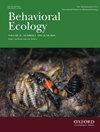Short-term heat waves have long-term consequences for parents and offspring in stickleback
IF 2.2
3区 环境科学与生态学
Q2 BEHAVIORAL SCIENCES
引用次数: 0
Abstract
Extreme temperature events, such as heat waves, can have lasting effects on the behavior, physiology, and reproductive success of organisms. Here we examine the impact of short-term exposure to a simulated heat wave on condition, parental care, and reproductive success in a population of threespine stickleback (Gasterosteus aculeatus), a small fish with exclusive paternal care, currently experiencing regular heat waves. Males were either exposed to a simulated heat wave (23°C) for five days or held at ideal temperature (18°C). Following this five-day treatment, all males were transferred to 18°C where they completed a full parenting cycle. Offspring were raised at 18°C. We found that while mass and body condition were unaffected in males exposed to a heat wave, cortisol responses were dampened across the nesting cycle compared to control males. In addition, heat wave males had longer latency for eggs to hatch, lower hatching success, and showed lower levels of parental care behavior compared to control males. Offspring of heat wave males had lower body condition, affecting swimming performance. Altogether, our results highlight the long-term impact that even short-term events can have on reproductive success, parental behavior, and subsequent generations, providing insight into population responses to rapid environmental change.短期热浪对竹节虫的亲代和子代具有长期影响
热浪等极端温度事件会对生物的行为、生理和繁殖成功率产生持久影响。在这里,我们研究了短期暴露于模拟热浪对三刺鱼(Gasterosteus aculeatus)种群的状态、亲代照料和繁殖成功率的影响。雄鱼要么在模拟热浪(23°C)中暴露五天,要么保持在理想温度(18°C)下。经过这五天的处理后,所有雄鱼都被转移到 18°C,在那里它们完成了一个完整的育儿周期。后代在18°C的环境中长大。我们发现,虽然暴露于热浪中的雄性个体的体重和身体状况未受影响,但与对照组雄性个体相比,皮质醇反应在整个筑巢周期中受到抑制。此外,与对照组雄鸟相比,热浪雄鸟的卵孵化潜伏期更长,孵化成功率更低,并且表现出更低水平的亲鸟照料行为。热浪雄鱼的后代身体状况较差,影响了游泳性能。总之,我们的研究结果突显了即使是短期事件也会对繁殖成功率、亲代行为和后代产生长期影响,为研究种群对快速环境变化的反应提供了深入的见解。
本文章由计算机程序翻译,如有差异,请以英文原文为准。
求助全文
约1分钟内获得全文
求助全文
来源期刊

Behavioral Ecology
环境科学-动物学
CiteScore
5.20
自引率
8.30%
发文量
93
审稿时长
3.0 months
期刊介绍:
Studies on the whole range of behaving organisms, including plants, invertebrates, vertebrates, and humans, are included.
Behavioral Ecology construes the field in its broadest sense to include 1) the use of ecological and evolutionary processes to explain the occurrence and adaptive significance of behavior patterns; 2) the use of behavioral processes to predict ecological patterns, and 3) empirical, comparative analyses relating behavior to the environment in which it occurs.
 求助内容:
求助内容: 应助结果提醒方式:
应助结果提醒方式:


